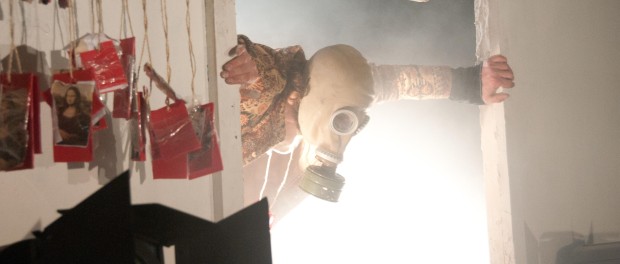L’Homme du sous sol : Dostoyevsky’s masterpiece revisited
L’homme du sous sol is Simon Pitaqaj’s adaptation of the brilliant Fyodor Dostoyevsky’s 19th century work, ‘Notes from the Underground’. Called the first writing that spoke to Existentialism, ‘Notes from the Underground’ presents an extremely challenging, emotionally interruptive canvas to explore questions of who, why and what we are.
Simon Pitaqaj, the creator and the actor of this monologue piece greets us in the hallway that leads up to the stage (the basement space where “l’Homme” has been inhabiting all his days). Right off the bat we are confronted by his piercing eyes, as he connects with his audience with questions of his sickness, his diabolical isolation; all perceived evil by the normative world. Playing right into the stereotype of what isolationists inhabiting basements are supposed to represent, Pitaqaj is penetrating and reflective, both at the same time.
After the emotional bombardment of the hallway, we move into the space that he has been inhabiting. Pitaqaj brings the audience right in by putting questions to them about our existence and what stirs it. It’s a very interesting ploy by Pitaqaj to break the monotony of L’Homme’s solitude and bring the audience into his world. This engagement sets the tone for the emotional roller-coaster that will follow.

l’homme du sous sol
The basement space is lined with images of Lisa, a lost and forgotten love that continues to haunt L’Homme. The images (inspired from DaVinci’s Mona Lisa) are strewn in different forms and perspectives. It’s his attempt to keep alive various memories of her. The rest of the wall space is cluttered by quotes from Dostoyevsky, surrounding his physical and mental space with this thought process.
L’Homme du Sous Sol is a scathing rebuke of the world that lives, hypocritical and modern, lacking the basic fundamentals of solitary reflection, connection with the truth, and the reasons of who we are. L’Homme has had the luxury to explore all of these. He is constantly solving problems, philosophical, yes, emotional, yet the drive is always to get on the other side of all problems. Then L’Homme suddenly questions the ideals of our modern societies: freedom of thought, freedom to be who we are. He questions how the grandiose words ‘democracy, liberty and freedom’ can mean anything to a world enslaved by greed and power, and how the incompatibility of these ideals continues to bind us in its strangulating shackles.
L’Homme calls his guilt out for his intelligence, which is his greatest failing, as the altar of his ancestors looks upon him, reprimanding and questioning him constantly.
L’Homme moves between experiences and philosophical ideas, from the comparison of whether the present is any better than the past that was, to how pain and suffering can also speak to the cleaning of one’s being, albeit through the trauma of violence that comes with it.
This piece questions normalcy, the idea of the living versus the outcast, how the continued occupation with material and the drive towards modernity and our so called ‘life’ leaves no room for reflection or introspection. It took Pitaqaj over seven years to work with Dostoyevsky’s writings, which gave him the space and time to personalise what the ‘Notes from the Underground’ spoke to. This historical text and all that comes with it seems more relevant today than it would have been in the mid 1800’s when it was written.
This is a dense piece, with questions that go deep, deep into the complexities of who we are. Pitqaj is emotionally incisive, brilliant and commands your attention throughout the 70ish minutes of this performance.
The play (in French) runs at Theatre Prospero (1371 Rue Ontario) Tuesday-Saturday until Feb 13. Tickets and showtimes HERE.






